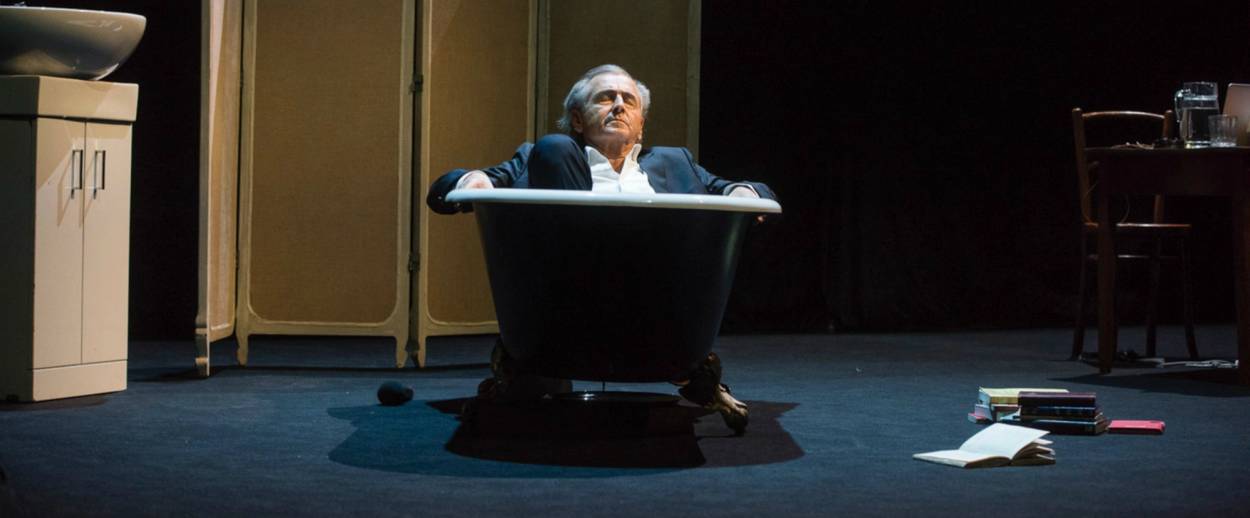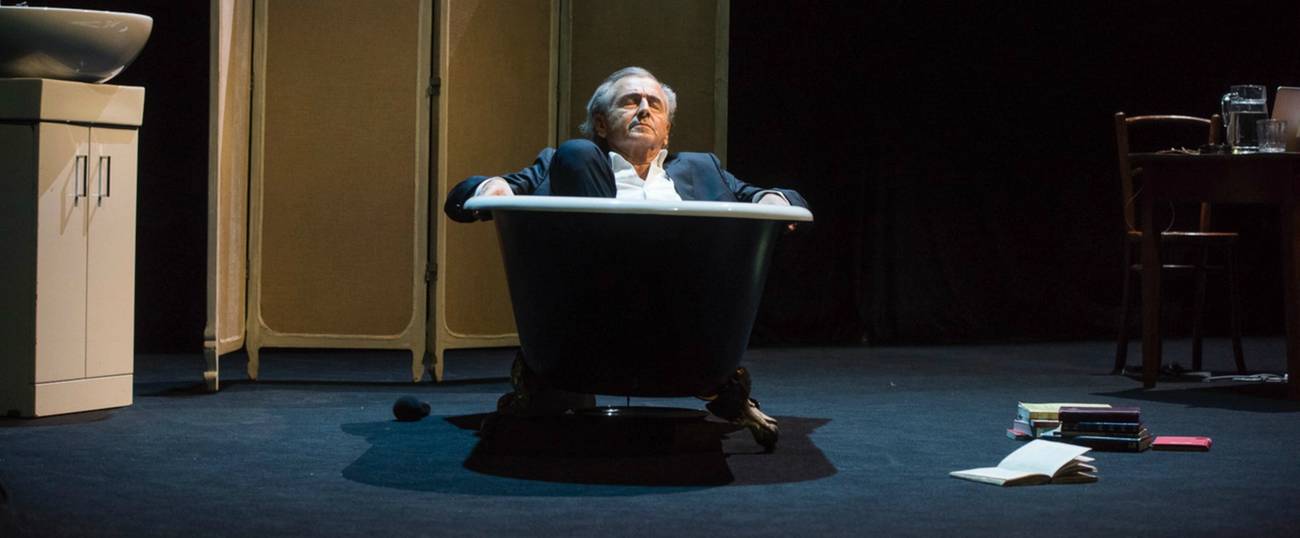In Brilliant New Play, Bernard-Henri Lévy Takes On the Follies of Brexit
‘Please, please remain. The long march begins tonight.’




One of the world’s greatest philosophers lies soaking wet. The famous open necked white shirt—as ever unbuttoned almost to the waist—is plastered to his chest.
Bernard-Henri Lévy is splayed out in a freestanding white bathtub on a stage surrounded by just under 1,000 people who have just gasped in shock. The perennially elegant Lévy has—for the briefest of moments—stepped out of character.
Last Exit Before Brexit is many things: a play, a monologue, a piece of performance art, but above all it is a cri de coeur from a deeply European man to a recalcitrant Britain. And it is a powerful one. For Lévy, Brexit—the UK’s decision, taken in a referendum in 2016, to exit the European Union—was a colossal mistake, one that will damage not just Britain but the EU itself.
Lévy proclaims that the U.K. is both the heart and brain of Europe (an extraordinary thing for a Frenchman to say), and he is worried. Indeed, the genesis for the play began when his friend Sophie Wiesenfeld, who runs the Hexagon Society in London and was responsible for putting on the play, phoned him after the Brexit vote. “You were right,” she told him. “Now is the time to fight back against all this populism.”
Lévy agreed. Last Exit Before Brexit was born, and it is a triumph, one that only Lévy could pull off. He—perhaps alone among philosophers, a breed not known for their charm—has the charisma to carry off a one-man show that leaves the viewer feeling simultaneously engaged, entertained, and educated. His intellectual depth and erudition unspools before your eyes, often in a quasi-stream of consciousness monologue that, unlike the great modernists, remains accessible at all times.
His thesis may be wrapped within the type of effortless eloquence Lévy possesses, but it is unwavering and simple and compelling: “Without Europe, Great Britain will become Little England,” he declares, “and without Great Britain, Europe will crumble.”
Lévy associates the EU dream with liberalism, which, for him, is a fundamentally English idea. Unlike many of his French contemporaries, he takes his cue from the Enlightenment values of Voltaire rather than Rousseau—and from the Anglo-Saxon liberal pragmatism of a John Locke or Bertrand Russell rather than the French theory of someone like Jean-Paul Sartre, who ended up an apologist for the crimes of Stalin and Soviet Communism.
For Lévy the issue is binary, and as he issues forth, enlisting everyone from Churchill to Florence Nightingale to John Locke to Karl Popper and even David Bowie in the service of his arguments, it’s hard to disagree. The battle is clear: ignorance versus knowledge, greatness versus pettiness of the mind, and, though he never quite says it, civilization versus possible barbarism.
And as he monologues, he Googles. That is to say: He searches. For knowledge and, more pertinently, for anti-knowledge. “Fake news” comes up on the search engine–“Melania Trump declared missing.” As he harks into the past it is also clear that we are watching something deeply contemporary. And that this man, who is almost 70 years old, understands the great information shift, both technologically and ideologically, that we are undergoing, and how vital it is to the populist project.
And so we return once more, to the figure, soaking wet, of a man who has immersed himself not just in water, but in history and its attendant bloodshed. And he is beseeching us, in this exceptional and triumphant performance, that we have one last chance, one last possible exit—before Brexit.
Amid the politics and philosophy and history (and indeed the incoming call from Salman Rushdie) Lévy touches on Jeremy Corbyn, the hard left Labour Party leader, who has been involved in innumerable anti-Semitism scandals, and through him, a perennial concern of Levy’s: anti-Semitism.
If Brexit did one thing apart from begin the process of the U.K. leaving the EU, it empowered the nation’s populists. On the right, the former head of the U.K. Independence Party (UKIP) Nigel Farage, a once obscure politician giving to making racist remarks about Romanians who morphed into arguably the most prominent (at least in terms of air time) politician in the country, who lead a party filled with anti-Semites of all kinds.
On the left is Corbyn, who is, naturally, a Brexiteer. Labour was ostensibly against Brexit, but Corbyn’s lackadaisical approach to campaigning and refusal to divulge whether he voted yes or no, not to mention 30-year-long antipathy toward the EU, made the question redundant anyway.
That Corbyn’s recent defense of a mural so anti-Semitic that even a certain part his own supporters were forced to condemn him (the mural displayed a group of elderly men, some of whom had hooked noses, playing monopoly on a board stacked high with cash resting on the bent over backs of the “working people”) came as no surprise is terrifying. This is not a 16-year old with stained boxers tweeting from his mom’s basement; it’s the leader of her Majesty’s official opposition.
Corbyn was elected as a protest vote on a wave of populist sentiment—and all that has brought with it. Anti-Semitism has become normalized in the inner circle of the Labour Party along with anti-EU ideals.
British Jews are now encircled, facing threats from the right and the left. In 2016, a member of an anti-EU far-right group shouting “Britain first” shot and stabbed the Labour MP Jo Cox (who Lévy namechecks in the play) as she campaigned for the U.K. stay in the union.
For those on the left like Corbyn and his ilk, the EU represents something that every Jew will be familiar with: an unelected, foreign, cabal that controls the lives of the “good and honest” working people.
The bloodstream of the British body politics now courses with populism and the mentality of the mob. And the mob has never been and never will be good for the Jews. This is something Lévy understands: at the intellectual level, as a thinker and at the instinctive level, as a Jew.
And so, the stage is sparse. A bathtub, a table and chair, some whiskey—it’s decked out like a hotel room in Sarajevo, a place close to Lévy’s heart. It is also a place of suffering and war and death. It’s a place that reminds us of the depths that Europe can sink to, of the conflict that was an almost constant for the continent until the coming of the EU after World War II.
Stripped down to this essence: The famous philosopher becomes a single man; the erudition boiled down to a simple message.
“Please, please remain,” he cries. “The long march begins tonight.”
David Patrikarakos is the author ofWar in 140 Characters: How Social Media is Reshaping Conflict in the Twenty-First Century. His Twitter feed is @dpatrikarakos.